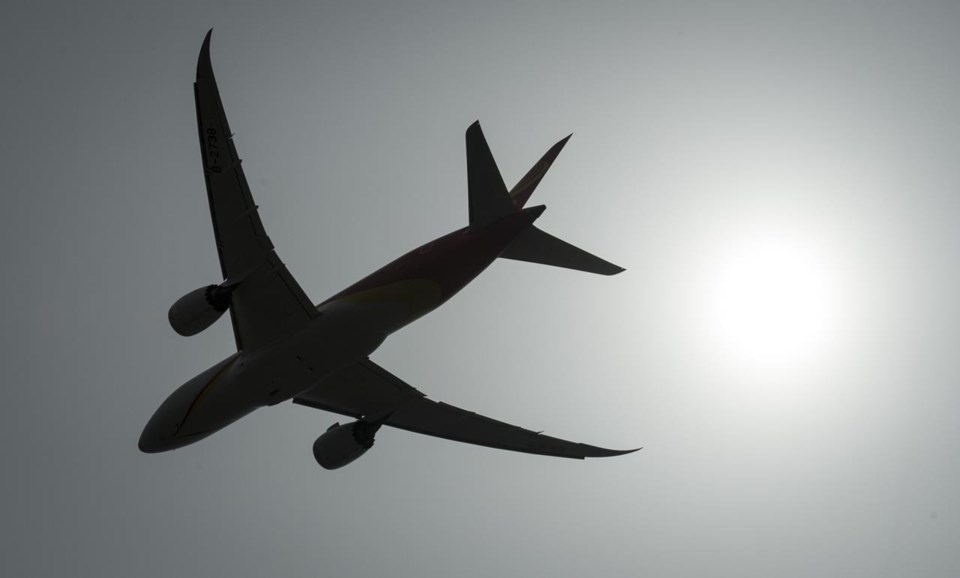MONTREAL — As higher inflation and interest rates continue to strain consumer pocketbooks, air travel may feel increasingly out of reach.
But a handful of novel approaches to buying fares has hit the market, offering snowbirds and infrequent fliers alike a chance to purchase tickets in ways that allow small savings or flexible payment.
Price freezing, subscription plans and buy now, pay later are among the newer options.
The first of these refers to spotting a price for a plane trip, hotel or car rental and freezing it on the spot for potential purchase later.
“Say you're searching for a flight and you see a price that looks really good, but you're not ready to book it right this minute — maybe not today, maybe not for a couple of days. You pay a small fee, we lock in that price,” said Hayley Berg, an economist at app-based travel agency Hopper Inc., which offers the service.
“If the price of your trip has gone up, you pay the lower price, the price that you froze, and Hopper pays the difference” — up to a ceiling of US$300.
“If the price goes down, you pay the lower price.”
The savings aren’t necessarily big, and the price freeze melts after a week or less. The option comes with an average fee of US$47 — an amount you don’t get back should the price fall, or if you hold off on a purchase — according to Hopper.
“Some are using this as a tool to hold the price, so they can finalize plans and then go on to book. But others are using it to hold a price until payday hits,” Berg said.
Google Flights offers a comparable service. Its Price Guarantee program tracks the flight price from payment to departure and reimburses the difference between the fare paid and the lowest price tag available in that timespan, assuming it’s more than US$5. The program is free, but flights must originate in the U.S. to be eligible, and most are through three airlines for the time being: Alaska, Spirit and Hawaiian.
Expedia has a similar “price-drop protection” option for most flights, for a fee. Other service providers offering a form of fare locking include Trip.com, Amadeus, MakeMyTrip and some airlines.
Buy now, pay later plans have emerged as another tool in the kit, though advocates say consumers should approach with caution.
The method lets customers purchase tickets on an installment plan, repaying the full cost over time, plus interest.
“Traditionally in travel, people would pay with credit cards, because we’re not talking about a pair of shoes here. It can easily be $2,000 for a flight or a package or a couple of tickets," said Denise Heffron, managing director of commercial operations in Canada at Uplift.
Founded in 2019, the Silicon Valley start-up now partners with more than 300 airlines — including Air Canada — cruise lines and hotel chains to offer loan terms that range between six and 24 months.
Heffron said that "things just exploded" in 2022 as post-pandemic travel resurged — alongside rising inflation and interest rates, putting ever more pressure on purses and wallets.
For buy now, pay later plans, interest rates at Uplift run the gamut from zero per cent to 13.99 per cent on ticket prices that start as low as US$99.
"The assumption is that people are using this because they don’t have money. But it’s really about choice, it’s about flexibility, it’s about access and it’s about budget management," Heffron said.
Other firms that offer the service include FlyNowPayLater, Flymble and Affirm.
For frequent fliers, subscriptions may warrant consideration.
Air travel can be viewed as low-volume, high-value — the inverse of music or television streaming, where subscriptions have proliferated. But for regular sky commuters, several airlines now offer monthly passes.
Air Canada touts an array of subscriptions, including the "starter" pass that allows four one-way flights within a year for $98 per month or $926 all at once. That lowest option is for Central Canada and includes only the Toronto, Montreal and Ottawa airports. But a $1,487 starter pass — $158 per month — permits the same number of trips to select cities that sit between Victoria and Montreal.
Student passes for six trips within Canada over a 12-month time span range from $114 to $170 monthly — the total, if purchased as a lump-sum payment, amounts to roughly 20 per cent less.
Meanwhile, sun lovers can catch a half-dozen one-way flights between Florida and select Canadian cities starting at $3,339 or $155 per month. And smaller companies can buy a business pass starting at $9,085 that gets regional "commuters" 30 flights within Alberta for up to 10 travellers.
This report by The Canadian Press was first published Sept. 28, 2023.
Christopher Reynolds, The Canadian Press



